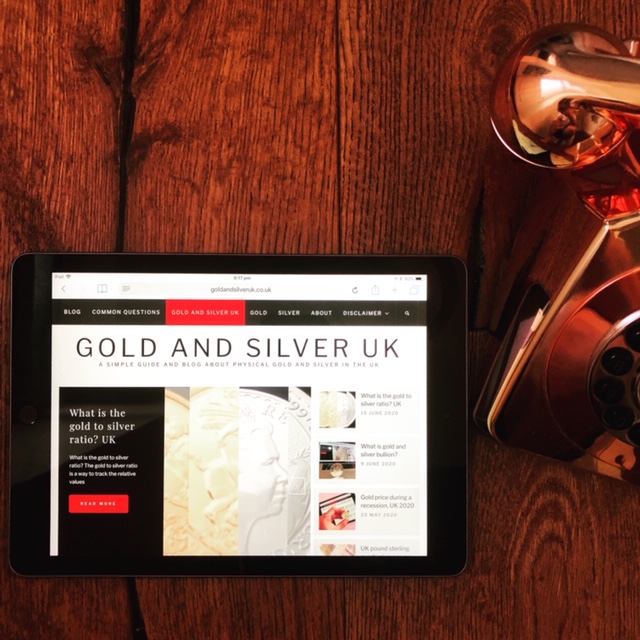Table of Contents
Gold, Silver and UK Tax.

Gold and silver coins or bars are probably one of the best ways to invest in physical gold and silver bullion in the UK.
However, if you are going to invest in gold and silver bullion, there are UK precious metal tax laws you should be aware of before investing in gold and silver bullion.
Capital gains tax.
So, what is Capital gains tax? Capital gains tax is a tax on the profit you make when you liquidate, sell, or give away, an asset or investment that has increased in value. The tax, however, is only due when you come round to selling your asset/investment and therefore realise the profit.
Assets could include a wide range of investments such as investment property, antiques, classic cars, vintage wine, shares and, of course precious metals. Gold and silver bullion for example, are subject to UK capital gains tax.
If you are a UK resident, then UK residents have an annual capital gains tax allowance. Any gains over an individual allowance would then be subject to capital gains tax at current HMRC rates.
Currently (2020-21), a UK individual is allowed an allowance of £12,300 net across all investments in a tax year before reaching this threshold and, therefore, are then liable for capital gains tax.
It is best to check with HMRC or a qualified financial adviser for the most up to date information on capital gains tax.
It is worth noting that capital gains tax is actually exempt on UK legal currency.
Therefore, coins such as the British Britannia and British Gold Sovereign are especially popular.
The reason for this is that these coins are classed as British legal tender. They are Capital Gains Tax exempt, meaning you can effectively sell these specific coins and retain any profit tax free.
It would not necessarily be an issue of how many of these specific coins you have and their value.
VAT. Value Added Tax. UK.
Silver bullion is subject to VAT (currently 20% 2021).
At the present time (2021) there is no VAT on gold bullion.
Is there a way to avoid paying capital gains tax on Bullion?
Gold and silver bullion investors could consider the option to buy small quantities of gold and silver coins/bars. This would mean the when it came to selling gold and silver bullion, an investor could sell small quantities over a financial year and, therefore, keep within the annual capital gains tax threshold.
Again, specific legal tender coins, such as the British Gold or Silver Britannia and Gold Sovereigns, are capital gains tax exempt.
What is classed as investment gold?


4 Grams of FREE Silver on Sign up! VISIT BullionVault
BullionVault is the world’s largest online investment gold service taking care of $3 billion for more than 85,000 users.
According to the HMRC website Investment gold is either:
(a) gold of a purity not less than 995 thousandths that is in the form of a bar, or a wafer, of a weight accepted by the bullion markets.
(b) a gold coin minted after 1800 that is:
• of a purity of not less than 900 thousandths
• or has been, legal tender in its country of origin
• of a description of coin that is normally sold at a price that does not exceed 180 per cent of the open market value of the gold contained in the coin
(Source HMRC).
Examples of LBMA (London Bullion Market Association) gold and silver bar specifications include:
Gold: Fineness: Minimum acceptable fineness is 995.0 parts per thousand fine gold.
Silver: Fineness: Minimum acceptable fineness is 999.0 parts per thousand silver.
Both require specific marks: Serial number, Assay stamp of refiner, Fineness (to four significant figures), Year of manufacture (Source LBMA.org.uk).
It is the responsibility of the investor to declare any capital gains tax payable to HMRC. Always seek professional financial advice before making any investment decisions.
BullionVault lets private investors around the world access the professional bullion markets. You can benefit from the lowest costs for buying, selling and storing gold and silver.
4 Grams of FREE Silver on Sign up! VISIT BullionVault
Disclaimer: The articles or blog posts on this website are for general information/opinion purposes only and does not constitute either goldandsilveruk.co.uk or the author(s) providing you with legal, financial, tax, investment, or accounting advice. You should not act or rely on any information contained in the articles without first seeking independent professional advice. Care has been taken to ensure that the information in the articles are reliable; however, goldandsilveruk.co.uk does not represent that it is accurate, complete, up-to-date and/or to be taken as an indication of future results and it should not be relied upon as such.
The site goldandsilveruk.co.uk will not be held responsible for any claim, loss, damage, or inconvenience caused as a result of any information or opinion contained in these articles or blog posts and any action taken as a result of the opinions and information contained in these articles or blog posts is at your own risk. All rights reserved www.goldandsilveruk.co.uk
This website/blog may generate revenue through paid sponsorships, advertising, paid insertions and affiliate partnerships.
goldandsilveruk is a precious metals enthusiast who wants to give authentic, clear, simple, transparent information and opinion to readers. Compensation may influence advertising content, topics or posts made on the blog. However, all paid and/or sponsored content and advertising space and posts would be identified.
All facts and claims made in posts should be independently verified with the manufacturer or provider. If a conflict of interest exists in the content, it may not always be identified.
Changes made to the policy will be identified on disclaimer page and in the general privacy policy and T&C.
